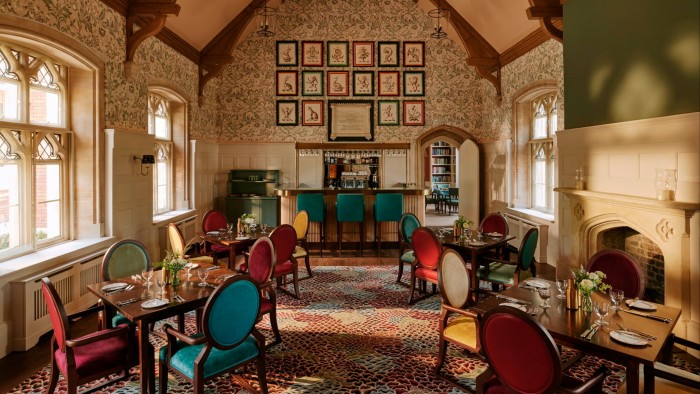Summarize this content to 2000 words in 6 paragraphs in Arabic KYN Hurlingham, a grand, red brick Victorian building in Fulham, London, adjacent to the famous members’ club, does not look like a care home. A school, maybe — it was one for more than a century — or perhaps a stately home.It does not feel like a care home either. There is a spa, gym, treatment centre, private cinema and a sensory garden designed for residents with dementia. Food, served in the wood-beamed, vaulted-ceilinged Great Room, is prepared by Michelin-starred chef Tristan Welch in a collaboration with nutritionist Eva Humphries. Scallops, roast lamb and Scottish cranachan are all on the menu when I visit.The interiors — botanical patterns, vibrant fabrics and natural light — are designed by Nina Campbell, whose clients include the royal family. The artwork, curated by Slade-trained Adam Ellis, is intended to “look like it’s been collected over the years, and not feel like an institution”, says marketing director Rosanna Fishbourne. There is even a fragrance to the air — essential oils — created to stimulate residents’ senses.KYN is one of a growing number of high-end care home operators in the UK that combine state-of-the-art facilities with residential care and nursing. Concentrated in affluent urban areas, they aim to attract the wealthy tiers of a rapidly ageing population. Over the next 40 years, the number of people aged 65-79 in the UK will increase by a third, while those aged 80 and over — the fastest-growing segment of the population — will more than double, according to the Centre for Better Ageing. With longer life expectancy comes a greater demand for care: Knight Frank estimates that an additional 350,000 older people may need a care bed by 2050, almost doubling current demand, while the number of people with dementia (currently 982,000) is expected to rise to 1.4mn by 2040, says the Alzheimer’s Society.At the same time, seniors have more than £1.5tn in unmortgaged housing equity locked up in family homes and set to be released in the coming years, says Knight Frank. Compared with traditional care homes, KYN and its ilk are “a very different model”, both in terms of their facilities and in-house specialist approach to care, says KYN managing director Caroline Naidoo. “We cater to residents who come for the more social aspects, right through to dementia and palliative care. There’s a huge spectrum.”I’d rather be here, enjoying all the facilities and activities, than stuck in my house with a staircase. I’m considering selling and moving here“The quality of the care homes being produced is incredible,” says Sam Rowland, head of healthcare and senior living at BNP Paribas Real Estate. “They are almost akin to hotels in terms of the facilities they’re offering.”In uncomfortably stark contrast to the wider sector, where there is an overall shortage of supply — more care homes are closing than being delivered, says Rowland — luxury care provision is expanding. KYN Hurlingham, which opened last June, is the company’s second site. Its first, in Bickley, south-east London, opened in February 2023. Five new homes are currently in development. Signature Care Homes, likewise, has 10 sites across south-east England, with three new homes opening in 2026. Its Highgate branch, which opened in December 2023, had a £50mn investment. Like KYN, the 70,000 sq ft building includes a bistro, garden, spa rooms, cinema, salon, as well as round-the-clock care and nursing for residents.It’s a rebrand for the market. Loveday, founded by the hotelier and former owner of the Four Seasons and Ritz-Carlton, Laurence Geller, is presented as a private members’ club. With care homes in Chelsea, Kensington and Abbey Road, and Belgravia and Esher set to open this year, its homes have a tailored programme of therapies, and lifestyle concierge services alongside specialised care. At KYN, where residents tend to be local, there is space for 32 at one time. Rooms cost between £3,500 and £6,250 per week to rent — £182,000 and £325,000 per year — which includes use of the facilities, all food and drink, weekly physiotherapy, spa treatments and 24-hour nurse call response. Care costs an additional £350 to £1,250 per week. Prices at Signature range from £2,245 to £2,845 weekly, plus extra care; Loveday is £3,000pw, plus upwards of £500pw for care. More widely, dementia nursing care costs an average of £1,447pw, according to the reviews site carehome.co.uk. KYN has one carer per two residents. “But with nurses, waiters, concierges and all the ancillary staff, it’s more like 1:1,” says home manager — and trained nurse — Jordan Pereira. Before residents move in, they complete a questionnaire which is used to assign them a “household” with a like-minded carer. “The care lead always works with the same group of five residents, so they get to know them very well. It provides continuity of care.”At homes like KYN, Signature and Loveday, new technology and subtle design are playing an increasing role in care provision. In KYN’s en-suite bathrooms the shower chairs are designed to look “less clinical”. The hospital beds, made by Accora, have paisley-printed headboards, crisp cotton sheets and discreet, integrated rails. “We worked with Nina Campbell to come up with this design, so it doesn’t feel like a hospital,” says Pereira. On the wall above are small acoustic monitors which detect abnormalities in residents’ breathing patterns as they sleep, meaning that they do not need to be disturbed overnight. A motion sensor on the ceiling works “like an infrared curtain”, generating an alert if a high-risk resident stands up in the night. There is an interactive “family portal” which allows residents’ friends and family to visit virtually, receive health updates and monitor their meals and activities. AI is used to help with pain management, scanning facial muscle movements to help determine a course of action. “The standard of care is on a different level,” says Naidoo.But for all the 24-hour room service, massage options and technology that a development may offer, it is the sense of community that residents seem to value most. “It’s [help with] things like shopping and preparing meals,” says resident June Barnett, who is “only 90”. “I don’t want to just sit in my room and read a book. I want to talk to people, do a crossword with someone . . . I don’t need too much care, but I’m having a nice time being cared about.”When we speak, Barnett is two weeks into a four-week trial stay at KYN Bickley. Since her husband died, she has been living alone in a four-bedroom house nearby, and felt that it was becoming “unmanageable”. She has joined exercise classes, “committed to getting the jigsaw puzzle done” with another resident, developed relationships over breakfast and shared her sudoku books. “I’d rather be here, enjoying all the facilities and activities, than stuck in my house with a staircase. I’m considering selling and moving here.”Like Barnett, many people look to move before their care needs advance. And although they may be keen to futureproof, moving into a “nursing” home is not always the first choice for younger, mobile and healthy retirees. Many, adds Jo Eccles, founder of buying agency Eccord, do not want to relinquish home ownership. “If you are used to having that control, financial and life stability that comes with home ownership, to give that up is quite a lot,” she says. “We find that they won’t rent, they will always buy.”For many, luxury retirement accommodation — also in growing supply — is providing an attractive alternative to the more conventional care home model. These developments are not nursing homes, but offer residents the option to bring in external care as their needs progress. “Retirement living is almost taking the place of the old-fashioned residential care home,” says Rowland. “You can move into a retirement community, have your own apartment, and you don’t need to go into a care home. You keep your independence.”Certainly, this is the case at Riverstone, a high-end retirement operator with branches in Fulham, Kensington and, as of next year, Hampstead. “We’re passionate about our wellbeing strategy, and the ability to keep people fit and healthy for as long as possible — to keep people out of care homes,” says chief commercial officer Shannan Hodgson. Backed by Goldman Sachs, it too is marketed like a members’ club, with residents able to use facilities across branches and take advantage of partnerships with the Royal Philharmonic Orchestra, English National Opera and Saatchi Gallery.My friends think I’m in a nursing home. But when they see the facilities and meet my neighbours, they get itEven so, when Sue Garwood, 66, moved into the Fulham branch in September 2022, her friends were “aghast”. She was still working in the City and had relocated from her two-bedroom flat in a development in Imperial Wharf. “They think I’m in a nursing home. But when they see the facilities and meet my neighbours, they get it.”Although Riverstone is targeted at younger, London-based, cosmopolitan retirees like Garwood, the intention is for residents to stay until the end of their lives. Certainly, this is Garwood’s objective: “I’m not moving. This is it.” Residents buy their apartments, which range between £810,000 for a two-bed and £7.98mn for a penthouse apartment at the upcoming Hampstead site. The buildings, explains Hodgson, have been “subtly” designed to Lifetime Homes Standards, meaning that they are wheelchair accessible with wide corridors and assistance buttons to cater for changing mobility needs. “I don’t think anybody goes in thinking that they want care, but we don’t know what the future will hold,” says Hodgson. Riverstone has partnered with care provider The Good Care Group, although residents can also bring in their own. At present, around 5 per cent of residents receive some form of external care. Luxury at-home care is also an expanding market. Loveday, for example, offers a service which “provides a member with the same high levels of care at home that they would experience in a Loveday residence”, while Venelle, which launched in London last year (and was founded by former Loveday manager Louise Blezzard), offers “tailored and discreet assistance” as well as specialised care. “Venelle is filling a gap for those who want the highest standard of care without compromising on their lifestyle or personal autonomy,” says Blezzard.Back at KYN Hurlingham, the first residents are beginning to enjoy the gardens, to savour the scallops in the Great Hall and laugh about the pronunciation of “cranachan” with the waiters. Great lengths have been taken to distance KYN and developments like it from, as Hodgson puts it: the dreaded association with mushy food, plastic chairs, set mealtimes and institutionalisation. But for those who can afford it, it goes further too: softening the painful realities of ageing with exemplary care and comfortable, quiet luxury.Find out about our latest stories first — follow @ft_houseandhome on Instagram
رائح الآن
rewrite this title in Arabic The high-end care homes taking their cues from hotels and members’ clubs
مال واعمال
مواضيع رائجة
النشرة البريدية
اشترك للحصول على اخر الأخبار لحظة بلحظة الى بريدك الإلكتروني.
© 2026 جلوب تايم لاين. جميع الحقوق محفوظة.









